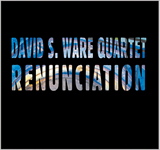|
|
 |
Dusted Reviews
Artist: David S. Ware Quartet Album: Renunciation Label: AUM Fidelity Review date: Jun. 14, 2007 |

|
|
|
 |
David S. Ware has never been welcomed in from the fringes by the jazz establishment, where to many he remains somewhat of an ancillary figure. But to those who prefer to dig deeper, in this case only a slight bit, Ware is often revered. A Grammy nod likely isn’t in the cards for the saxophonist, but Ware’s work, especially in the last 20 years, has been increasingly lauded as some of contemporary jazz’s best, especially within the context of Ware’s quartet, which some have called (hyperbolically) the best in jazz since Coltrane’s classic four. Renunciation, which documents the quartet’s 2006 farewell American performance, then, is not simply another jazz disc by a man who’s made many, at least not to those who hold Ware and his compatriots in such high esteem.
Amongst the dissenters in discussion of Ware’s work are the firebrands, those who believe that the old avant-garde is the new traditionalism, and that Ware is more a revivalist than an innovator. Between the aforementioned and those seemingly ready to crown Ware as jazz royalty, an agreeable (and probably most accurate) middle ground exists, one that finds Ware, a player mindful of his past and spiritually driven, working within the contexts in which he’s always worked, not overly considerate of pushing boundaries, just simply playing the music that he knows, loves, and, most importantly, feels. So, in June of ’06, surrounded as usual by his usual crew (William Parker, Matthew Shipp and Guillermo E. Brown), Ware embarked on a set sure to inspire feverous praise and elation from the converted, one of those concerts in which the music can come dangerously close to finding itself a footnote to the greater historical context of a night in the minds of those who attend. Renunciation, then, is a dose of reality – a document of the night as it was, not as it might be remembered; evidence that (despite even this review’s rather lengthy introduction, which might insist otherwise) the quartet’s performance at Vision Festival XI was, and should be, about the music.
The inclusion of the band’s introduction (and a more exuberant lead-in to an abbreviated encore) seem a slight tip of the hat to the night’s importance, but the drama drifts away when the group gets down to playing. Bookended by “Ganesh Sound,” which finds Ware extrapolating twisted melodic lines over a steady rhythmic theme, Renunciation finds Ware’s quartet well in their comfort zone; even at its most fervent, the music lifts off wildly, but never leaves orbit. Ware’s saxophone twists and turns, tying knots of sound in the music’s foreground. His support, ever valiant, threatens regularly to steal the show, especially Shipp, whose nimble excursions to all ends of his keyboard and rhythmic anchoring represents some of his best work with Ware. The three-part “Renunciation Suite” is unquestionably the album’s grand gesture, a 30-minute romp that, while prone to a hectic energy and wild forays, underlies greatly the quartet’s synergy, with players popping in and out of the mix, engaging in rapid musical conversation, and changing direction with a unison that’s impressive, but not so precise as to be artificial. There’s no question that the four share a remarkably cohesive sense of musical interaction, and even when improvising on wholly different planes, the musicians seem to realign with no trouble for moments that are likely more purposeful than their seemingly serendipitous nature might belie.
Jazz’s avant-garde, since its birth in the 1960s, has continued to evolve in such ways that there can be considered a classic sound in what was once so new and unique, and the David S. Ware Quartet seem an exemplary contemporary specimen of the classic vein of avant jazz. A few somewhat ill-advised forays into new realms have been undertaken by the group (Shipp’s occasional use of a synthesizer perhaps the most obvious), but the quartet has, for years, been making the sort of spirit-infused, energetic jazz that was pioneered (and perhaps perfected) by John Coltrane so many years ago. And as their set came to a close that night with the dreamy reprise of “Ganesh Sound,” it must have seemed a perfect way to end, a piece with spiritual pathos and agile improvising from the quartet’s leader, culminating in a modest, understated end. But, the applause and obligatory encore come, as all must have expected they would, and when Ware and his quartet launch into “Saturnian,” the bop-ish backbone of the frenetic romp is a surprise. The four-minute jaunt is a modest one, played straight, without space for monumental solos, or a miniature farewell tour from the members of the group. In fact, “Saturnian” ends quickly, with no crescendo or fanfare, and, just like that, the performance concludes – a somewhat inauspicious finish to a poignant performance for those who’ve followed the group for years. Renunciation finds the quartet going out at the top of their game, with one of their better efforts in recent years, and regardless of one’s admiration or lack thereof for the group, it’s a farewell that’s hard not to respect – one with feeling, power and modesty, a conclusion befitting the band’s career.
By Adam Strohm
|







